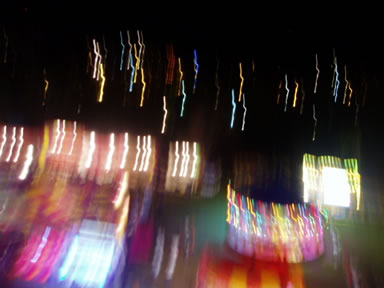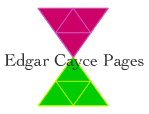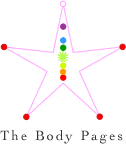Discover Seth's Amazing Sleep Experiment...

| It was in the year 2000 that I discovered Seth. I had had a mind-blowing experience with Astrology just a year earlier and had begun to see that the world was a whole lot more magical than I'd previously thought. I was open to new ideas and ready to transform. (Pluto was conjunct my Sun encouraging me to change on a profound level, Uranus was square my Mercury alerting me to crazy new radical ideas, as well as sextiling my Venus, making it easier to be open to these crazy new ideas....and Neptune was exactly opposite my Moon/Jupiter giving me a kind of dreamy, compassionate, perhaps slightly disorientedly openness) So, in this state of open-ness, I was shopping at Value Village and found myself in the 'spiritual' section. I don't think I'd ever looked in that section before as I really had no interest in that stuff. Standing there, with just two shelves of books to choose from, one book popped out at me, "Seth Speaks". I looked around, hoping no one I knew was watching me and sureptitiously started reading....and, I was instantly hooked! Whoever this channeled entity, Seth, was....I loved him! He was smart, rational, interesting and totally original! But, oh my god, this was going too far, what would I turn into? One of those weirdo people! After much internal debate I sandwiched Seth Speaks between two other 'respectable' books and purchased it. That night I read it to my boyfriend while he took a bath and we both found it just waaaaay too fascinating! That's one of the qualities I really loved about B. Unlike my other boyfriends (I'm a serial long-term monogamist!) he was very open-minded and, perhaps because he was born with Neptune conjunct his Sun, he was already aware that the world was different than we'd all been led to believe. I would have never been able to have expanded into all that I am without his support and encouragement and open-mindedness. He never once scoffed or made jokes (which a lot of guys will do...grrrr). You see, I'd been a real rationalist! Total left brain. But, poco a poco, I'd had experiences that showed me that I was only using half of what was available. It was through reading Bachelard's Poetics of Space and Poetics of Reverie in 1994 that I really began to see that I wasn't using my right brain at all but that I have natural tendencies towards right brain use that I was repressing! (I do have, after all, Neptune conjunct my Mercury in Scorpio and Saturn in Pisces). So, once I'd allowed myself to read that first Seth book I found all of them and steeped in them. I began to have amazingly synchronicities happen in my life and there was a stretch of probably 4 years where my dreams were very intense and significant. I had a Dream Guide who talked to me with 'the voice' and showed me how things worked. Totally deep and profound! Ahahhhhh I loved that excitingly transformative and magical time in my life. One of the things that Seth said was that we should change our sleeping pattern so that we are more healthy, creative, balanced and alive. He outlined how to do it and explained the whys and wherefore's and so, in 2002 we did it for the first time. I used to be a moderator on www.curezone.com in the early 2000's and the following is an excerpt from the post I made on our Seth Sleeping Experiment:
|
Seth's Sleeping Experiment in his own words....
"Persons
vary in the amount of sleep they need, and no pill will ever allow them
to dispense with sleep entirely, for too much work is done in that state.
However, this could be done far more effectively with two, rather than
one, sleep periods of lesser duration. Two periods of three hours apiece
would be quite sufficient for most people, if the proper suggestions
were given before sleep. Suggestions that would insure the body's complete
recuperation. In many cases ten hours sleep, for example, is actually
disadvantageous, resulting in a sluggishness both of mind and body.
In this case the spirit has simply been away from the body for too long
a time, resulting in a loss of muscular flexibility.
As a result of more frequent, briefer sleep periods, there would also
be higher peaks of conscious focus, and a more steady renewal of both
physical and psychic activity. There would not be such a definite division
between the various areas or levels of the self. A more economical use
of energy would result, and also a more effective use of nutrients.
Consciousness as you know it would also become more flexible and mobile.
This would not lead to a blurring of consciousness or focus. Instead
the greater flexibility would result in a perfection of conscious focus.
The seeming great division between the waking and the sleeping self
is largely a result of the division in function, the two being largely
separated a block of time being allotted to the one, and a larger block
of time to the other. They are kept apart, then, because of your use
of time.
You
would retain a far greater memory of your subjective experiences, and
your body would be healthier, if these sleeping patterns were changed.
Six to eight hours of sleep in all would be sufficient with the nap
patterns outlined. And even those who think they now need more sleep
than this would find that they did not, if all the time was not spent
in one block. The entire system, physical, mental, and psychic, would
benefit.
Now:
I bring up these matters here because such changes in habitual patterns
would definitely result in greater understanding of the nature of the
self. The inner dreaming portions of the personality seem strange to
you not only because of a basic difference of focus, but because you
clearly devote opposite portions of a twenty-four hour cycle to these
areas of the self. You separate them as much as possible. In doing so
you divide your intuitive, creative, and psychic abilities quite neatly
from your physical, manipulative, objective abilities. It makes no difference
how many hours of sleep you think you need. You would be much better
off sleeping in several shorter periods, and you would actually then
require less time. The largest sleep unit should be at night. But again,
the efficiency of sleep is lessened and disadvantages set in after six
to eight hours of physical inactivity. The functions of hormones and
chemicals, and of adrenal processes in particular, would function with
far greater effectiveness with these alternating periods of activities
as I have mentioned. The wear and tear upon the body would be minimized,
while at the same time all regenerative powers would be used to the
maximum. Both those with a high and low metabolism would benefit. The
psychic centers would be activated more frequently, and the entire identity
of the personality would be better strengthened and maintained. The
resulting mobility and flexibility of consciousness would cause an added
dividend in increased conscious concentration, and fatigue levels would
always remain below danger points. A greater equalization, both physical
and mental, would result.
Now your consciousness does return at times, to check upon the physical
mechanisms, and the simple consciousness of atom and cell--the body
consciousness-is always with the body, so it is not vacant. But the
largely creative portions of the self do leave the body, and for large
periods of time when you sleep. Some cases of strong neurotic behavior
result from your present sleeping habits. Sleepwalking to some degree
is also connected here. Consciousness wants to return to the body, but
it has been hypnotized into the idea that the body must not awaken.
Excess nervous energy takes over, and rouses the muscles to activity,
because the body knows it has been inactive for too long and otherwise
severe muscular cramps would result.
Now:
It is well known that fluctuations of consciousness and alertness exist
in the sleep state. Some periods of dream activity do indeed supersede
those of some waking states. But there are also fluctuations in normal
waking consciousness rhythms of intense activity followed by a much
less active period of consciousness.
A
clear, uncluttered, bright, and powerful consciousness needs frequent
rest periods if its efficiency is to be maintained, and if it is to
correctly interpret reality. Otherwise it distorts what is perceived.
Rest or sleep cures - very extended sleep periods - have been helpful
for therapy in some cases not because extended sleep is in itself beneficial,
but because so many toxins had built up that such extended periods were
required. Learning processes are definitely hampered through your present
habits, for there are certain periods when consciousness is attuned
to learning, and yet you try to force learning during unrecognized minimal
periods. Creative and psychic abilities are thrust into the background
simply because of this artificial division. Dualities result that affect
all of your activities. In some cases you literally force yourselves
to sleep when your consciousness could be at one of its maximum points.
This is, incidentally, in the predawn period. In certain afternoon hours
consciousness is lowered, and needs refreshment that is instead denied. Seth as channeled by Jane Roberts |

Sunrise in Mexico










